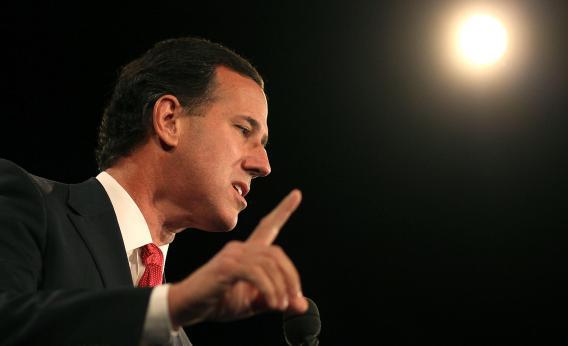Look at the polls, look at the fundraising numbers, and look at the shifting priorities of the GOP base, and you come to a conclusion about Rick Santorum: He’s not going to be the Republican nominee.
But why look at any of that stuff? The press can create its own reality about a presidential campaign. The press can invite or disinvite candidates into debates. The press can label a candidate the “Queen of the Tea Party,” and frame all coverage of the conservative grassroots’s demands that way. Ron Paul’s campaign can complain about a lack of coverage, then get more coverage from a thin-skinned press corps. The press can decide whether someone is a truth-telling maverick or a bumbling loose cannon.
With that in mind, the Washingon Post’s conservative blogger Jennifer Rubin has been conducting an open air experiment. What if a writer with a powerful masthead covered a GOP also-ran – Santorum, in this case – like a surging contender?
On September 12, the hawkish Rubin was clearly disappointed by the GOP candidates’ America First tone. Left holding the bag for neoconservative foreign policy: Santorum. Rubin pronounced him a winner of the debate, and then, pretty much alone among national reporters, reached out:
Perhaps Santorum should get another look. In response to my request for comment (Santorum was not asked to weigh in on this point during the debate), I got this e-mail: “As I said on Greta Van Susteren’s show last night, I listened to both men answer and I couldn’t believe that neither mentioned the word victory…”
On September 14, Rubin interviewed Santorum over the phone, giving him a chance to fire a shot at Perry over the governor’s perceived anti-intellectualism. She pronounced him presidential.
Santorum has been the only Republican in any GOP debate to discuss the poor specifically. In speaking about his efforts to pass welfare reform in the Reagan Library debate, he advanced themes not often heard in this race. It’s yet another example of why Republicans need to focus on the candidates with the best ideas, not the highest poll numbers or biggest campaign chests.
That day, the Santorum campaign sent out Rubin’s posts as an “ICYMI” (in case you missed it) e-mail, a way that campaigns press favorable articles into the hands of reporters. September 16, Rubin gave Santorum another forum to scorch his rivals on national security.
What, in particular, gives Santorum cause for concern? He says, “I listened to Governor Perry and Ambassador Huntsman answer a question about Iraq, and I couldn’t believe that neither person mentioned the word ‘victory.’ To stand for anything less is a disservice to our troops, their families and our nation.” He cautioned that he “hates war — and every day I pray for our troops safe and speedy return. In fact, I believe our troops should come home as soon as the job is done. But the problem is, Barack Obama has never outlined a mission for victory.”
The courting and responsiveness were having some effect. On September 22, Rubin pronounced Santorum a winner, once more, of the debate. “As the debate went on, he received more and more questions, a sure sign he was becoming a contender.” On September 23, Rubin wrote that conservatives “are determined to win back the White House so they are now pondering the question: Mitt Romney, Rick Santorum or someone else?” On September 25, she pronounced Santorum one of the GOP’s three credible candidates: “A Christie-Rubio or a Romney-Ryan or Santorum-McDonnell ticket (or some combination thereof) would be formidable.” The next day, yesterday, she came up with a Santorum victory scenario.
Christie enters, but Santorum catches fire, winning Iowa and climbing into a three-man race with Christie and Romney, who divide the mainstream vote. Santorum consolidates support from the Tea Party and social conservatives and pulls a stunning upset.
Later in the day, she helped this scenario along by posing Perry’s spokesman Mark Miner against Santorum’s spokesman Hogan Gidley, drawing out the Perry campaign on his federalist acquiescence to state drug decriminalization. (Confession: I’m just jealous of Rubin here. I’d bugged the Perry campaign for comment after reading the drug law section of Fed Up!, and got nada.) She printed Gidley’s whole diss of Perry and added: “Ouch.”
The Rubin-Santorum alliance is one of the best things the candidate has going for him. A couple of times a week, the candidate can point to The Washington Post’s coverage as proof that he’s being taken seriously. He has done that before; his campaign mail in Iowa informed readers that a previous Post story, by Karen Tumulty, labelled him a proto-Tea Partier. The alliance gives him space to attack other candidates, which has been the Santorum modus operandi for at least a year. It’s fascinating to watch this unfold, a test of how much one member of the media can bend the narrative to boost a candidate.
